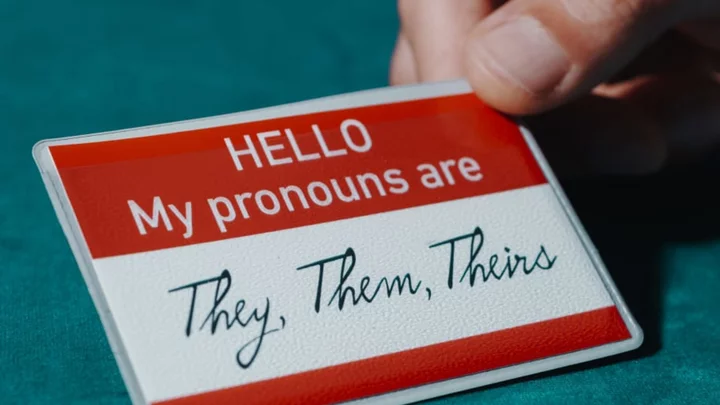It can happen to anyone: As you’re talking, you hear yourself say, “I heard that she—wait, I mean he!” A pronoun slip can be embarrassing, especially if you pride yourself on being generally good at using the language people have asked you to use.
But why do pronoun slips happen, and why do we seem to mess up pronouns more than names or other gendered words? Linguistics (the scientific study of language) has answers, and can give us insight into how to use the words we want to use—and the techniques are surprisingly similar to how we learn new languages.
Content vs. Function Words
As Schoolhouse Rock taught us, pronouns are words like we, you, and it that stand in for longer names or phrases. Pronouns, along with articles and prepositions, are part of a larger class of words called “function words” that our brains process mostly unconsciously, both because they’re so frequent and because they hold the structure of sentences together. On the opposite end are content words—parts of speech like nouns, verbs, and adjectives—which hold more attention because they deliver information.
Living languages are always changing, thanks in part to the fact that they’re constantly picking up new content words (like cheugy or rizz). But languages can go decades between picking up new function words; when they do enter a language, they tend to come in one at a time, and catch on much more slowly.
This is why the majority of people don’t learn many new pronouns (or other function words, for that matter)—there simply aren’t a lot out there, and because of that, your brain doesn’t get to practice learning new ones, meaning they’re harder to learn. It’s a self-perpetuating cycle.
And that’s not the only challenge with function words: The fact that they’re so automatic is why many people don’t even notice pronoun slips. There are also way more function words than content words—if you add up all the pronouns you say or hear in a single day, you’ll be shocked at how much more you use them than other common words. Because the brain tends to filter out very frequent things from your conscious awareness, function words are almost invisible to us unless we’re paying attention to them intentionally; there are even viral brain teasers showing how good our brains are at ignoring function words.
All of this means that there are lots of chances to mess up pronouns every day, without you even noticing. If you’re trying to use a new set of pronouns about someone—your friend who’s switching from they/them to she/her, for example—you have to overcome a very strong force of habit, because you’ve probably said “they” a lot. You have tons of practice with the old form, which gives you a kind of automatic muscle memory. Overriding that habit takes intentional effort and attention.
Linguistic Tips for Getting Better at Nailing Pronouns
Are we doomed, then, to constantly embarrass ourselves by messing up pronouns forever? Nope—all the linguistic science about function words can be used to strengthen our language brains.
The first step is simply to practice cultivating linguistic awareness: Try slowing down and paying attention to function words in your own and others’ language, just to get your brain used to actually noticing them.
Rewiring the way your brain does pronouns (or any function word) is very similar to second-language learning strategies. In addition to cultivating linguistic awareness, you should focus on repetition, reinforcement, and real-world practice.
You can get repetition and reinforcement by writing a story about your friend to practice her new pronouns, or you can get reinforcement and real-world practice by chatting with a mutual friend who can help correct you if you slip up. Positive reinforcement is just as important, too—having a “reverse swear jar” where you give yourself a nickel every time you get the new pronouns right can be a great way to solidify the pattern (and improve your linguistic awareness).
If you want to practice some pronouns that are completely new to you, you can change your pet’s pronouns to (for example) xe/xyr to get more repetition and real-world practice. These strategies all are focused at getting you that practice without the risk of misgendering your friend to xyr face, to save you and xem the discomfort.
The last tip isn’t a linguistic tip, but will make the process of training your brain less stressful: Take some time to learn social scripts for what to do if you mess up, and what to say if someone else messes up in front of you. Having a plan of what to say can reduce the feeling of anxiety that can make us defensive or avoidant. A short “shoot, sorry, I meant–” can be perfectly appropriate, and correcting yourself helps reinforce the linguistic pattern you’re trying to learn—win/win!
If you’ve struggled with pronouns, you’re not alone—it’s a direct consequence of the way our brains do language. But with some gentle exercises, it will very quickly start to feel easy and natural. Using the right pronouns is a great way to show your trans friends and loved ones that you support them, and working out your language brain has the added bonus of making you cognitively stronger and more flexible overall.
Are you a logophile? Do you want to learn unusual words and old-timey slang to make conversation more interesting, or discover fascinating tidbits about the origins of everyday phrases? Then get our new book, The Curious Compendium of Wonderful Words: A Miscellany of Obscure Terms, Bizarre Phrases, & Surprising Etymologies, out now! You can pick up your copy on Amazon, Barnes & Noble, Books-A-Million, or Bookshop.org.
This article was originally published on www.mentalfloss.com as Why It Can be Hard to Get Pronouns Right, According to Linguistics .

